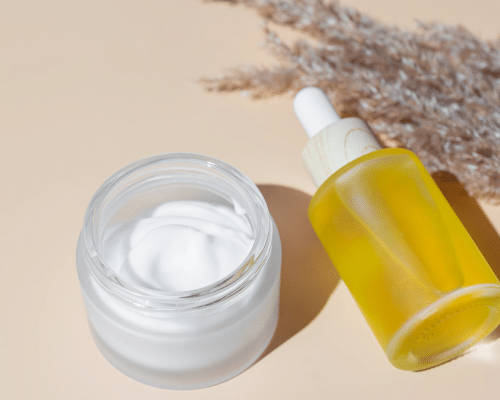Hydrogen peroxide can be used to help soften ear wax prior to your microsuction appointment.
What is Hydrogen Peroxide?
Hydrogen peroxide is an active ingredient in liquid form used in many earwax softening drops. It is also available as a stand alone product (hydrogen peroxide 3%) and can be used on its own to remove or prevent the build up of excess earwax.
Does Hydrogen Peroxide Work?
Hydrogen peroxide can assist in preparing excess ear wax to be removed from the ear canal. It works by breaking earwax down through the release of gas/bubbles, however on its own, hydrogen peroxide may not soften the wax but rather, break it down. This is why it is often combined with a softening agent, such as glycerin or oil, in order to increase its effectiveness in breaking down excess earwax.

Hydrogen Peroxide in Ear Wax Drops
Many over-the-counter ear drops will contain hydrogen peroxide as the active ingredient. Ear wax softening drops help to soften and break down ear wax which has built up in the ear canal. Ear wax softening drops come in three different varieties, which work to dissolve wax in different ways:
- Oil based drops work by lubricating and softening the wax but do not break it apart, e.g. olive oil, almond oil, mineral oil
- Water based drops induce hydration and subsequently break the wax apart, e.g. sodium bicarbonate, saline, waxsol
- Non-oil and non-water based drops break down the wax through the combination of active agents like glycerine and carbamide peroxide
Hydrogen Peroxide as a Preventative Measure
Hydrogen peroxide can be used as a ‘preventative’ to slow down the build-up of earwax once the ear is cleared. If you are part of the 1 in 20 adults in the population who suffer from cerumen (ear wax) impaction, regular use of hydrogen peroxide in the ear may slow the build-up of wax and help to lengthen the time between appointments for manual removal.
How to Use Hydrogen Peroxide for Cleaning Ears
Wondering if it is safe to put hydrogen peroxide in your ear? The answer is yes, but only if you use it in a safe way. Overuse of hydrogen peroxide can cause irritation within the ears. Please see a health professional before using hydrogen peroxide. Do not use hydrogen peroxide if you have a hole in the ear drum.
Hydrogen peroxide 3% can be purchased from your local chemist or even some of the larger supermarkets. It can be administered using a dropper or even a teaspoon. If you are using hydrogen peroxide on its own, do not use any higher than 3% hydrogen peroxide as this may irritate the skin inside your ear canal. You can also purchase this from your local Earworx clinic for your convenience.
Fill the dropper with peroxide 3%, place it at the entrance to your ear and fill up the ear canal with 1ml of the solution. You may feel a warm, tingling sensation. Allow the solution to bubble and fizz for 1 minute before tilting your head the opposite way and tipping it onto a tissue. You can repeat this daily to remove wax for 3-5 days until you do not see any more wax coming out on the tissue.
Is It Safe to Put Hydrogen Peroxide in Your Ear?
It is safe to put hydrogen peroxide in your ear in certain circumstances.
However, hydrogen peroxide in the ear is not suitable for use if you have a perforated ear drum/suspected perforated ear drum, if you have grommets, or if you are experiencing any irritation or pain inside your ear. In these cases, you should seek the advice of a medical professional.
Does Earworx Recommend Hydrogen Peroxide?
Please do not use hydrogen peroxide alone to soften prior to an Earworx appointment. Chemist wax softening drops are our products of choice. Using Ear Clear or olive oil from the chemist as recommended, two or three days before your Earworx appointment can help to soften and loosen impacted wax. This can make the micro-suction process much quicker and easier.
More Information
If you have questions or concerns, feel free to contact the friendly Earworx team. We’re more than happy to help answer your questions and to assist you in relieving your ears of uncomfortable, wax-related symptoms.
